-
 Bitcoin
Bitcoin $84,094.4129
1.60% -
 Ethereum
Ethereum $1,821.7742
0.59% -
 Tether USDt
Tether USDt $0.9997
0.00% -
 XRP
XRP $2.1407
3.87% -
 BNB
BNB $598.6984
1.20% -
 Solana
Solana $123.4827
5.75% -
 USDC
USDC $1.0000
0.01% -
 Dogecoin
Dogecoin $0.1722
7.24% -
 Cardano
Cardano $0.6642
2.33% -
 TRON
TRON $0.2385
0.43% -
 UNUS SED LEO
UNUS SED LEO $9.5334
1.35% -
 Chainlink
Chainlink $13.0140
1.67% -
 Toncoin
Toncoin $3.4052
-5.95% -
 Stellar
Stellar $0.2604
-0.03% -
 Avalanche
Avalanche $18.2768
0.91% -
 Sui
Sui $2.2810
1.88% -
 Shiba Inu
Shiba Inu $0.0...01232
0.77% -
 Hedera
Hedera $0.1646
1.14% -
 Litecoin
Litecoin $84.6257
1.99% -
 Polkadot
Polkadot $4.0498
-0.10% -
 MANTRA
MANTRA $6.2711
-2.10% -
 Bitcoin Cash
Bitcoin Cash $302.6871
0.34% -
 Bitget Token
Bitget Token $4.5346
1.16% -
 Dai
Dai $1.0000
0.00% -
 Ethena USDe
Ethena USDe $0.9991
-0.04% -
 Hyperliquid
Hyperliquid $12.2705
5.21% -
 Monero
Monero $217.6766
2.41% -
 Uniswap
Uniswap $5.9514
2.02% -
 Pi
Pi $0.5240
-7.74% -
 Pepe
Pepe $0.0...07231
8.85%
How are smart contracts automatically executed? What are the classic application scenarios?
Smart contracts on blockchains automatically execute when conditions are met, used in DeFi, supply chains, real estate, insurance, and gaming for efficiency and transparency.
Apr 04, 2025 at 01:01 pm
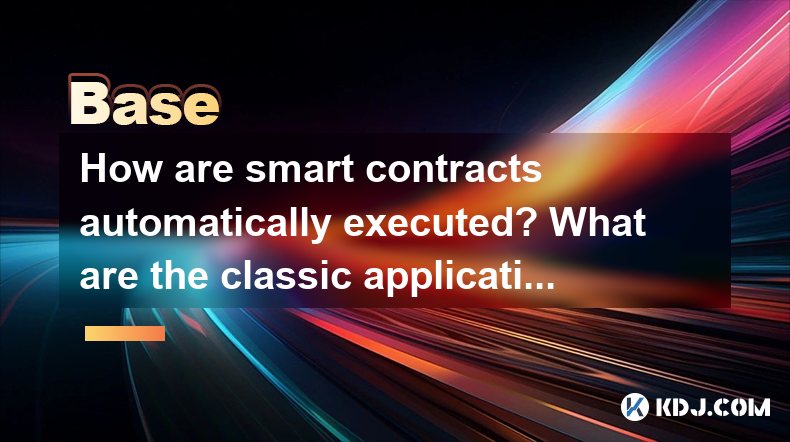
Smart contracts are self-executing programs stored on a blockchain that automatically carry out the terms of a contract between parties. They are designed to facilitate, verify, or enforce the negotiation or performance of a contract. The automatic execution of smart contracts is facilitated by the underlying blockchain technology, which ensures that once the predefined conditions are met, the contract executes itself without the need for intermediaries.
How Smart Contracts Are Automatically Executed
The automatic execution of smart contracts is based on if-then statements coded into the contract. When certain conditions are met, the smart contract automatically triggers the appropriate actions. Here is a detailed look at the process:
Deployment: A smart contract is first written in a programming language suitable for the blockchain it will be deployed on, such as Solidity for Ethereum. Once written, it is deployed to the blockchain where it becomes a part of the distributed ledger.
Triggering Conditions: The smart contract contains predefined conditions or rules. These conditions are constantly monitored by the nodes on the blockchain network. For example, if a smart contract is set to release funds when a certain date is reached, the blockchain nodes will check the current date against the contract's conditions.
Execution: When the conditions specified in the smart contract are met, the contract automatically executes the agreed-upon actions. This could involve transferring cryptocurrency from one party to another, updating records, or any other action coded into the contract.
Verification and Consensus: The execution of the smart contract is verified by the nodes on the blockchain. Once a consensus is reached among the nodes that the conditions have been met and the actions are correctly executed, the transaction is added to the blockchain, making it immutable and tamper-proof.
Finalization: Once the transaction is recorded on the blockchain, the smart contract's execution is complete. All parties involved can see the outcome on the blockchain, ensuring transparency and trust.
Classic Application Scenarios of Smart Contracts
Smart contracts have a wide range of applications within the cryptocurrency and blockchain ecosystem. Here are some classic scenarios where smart contracts are commonly used:
1. Decentralized Finance (DeFi)
In the realm of Decentralized Finance (DeFi), smart contracts are pivotal. They enable the creation of decentralized lending platforms, where users can lend or borrow cryptocurrencies without traditional financial intermediaries. For example, a smart contract can automatically manage the collateral, interest rates, and loan repayments based on predefined rules.
Lending and Borrowing: A user deposits cryptocurrency as collateral into a smart contract. The contract then allows the user to borrow against this collateral. If the user fails to repay the loan, the smart contract automatically liquidates the collateral to cover the debt.
Yield Farming: Users can stake their cryptocurrencies in smart contracts to earn rewards. The smart contract automatically distributes these rewards based on the amount staked and the duration of the stake.
2. Supply Chain Management
Smart contracts are used to enhance transparency and efficiency in supply chain management. They can automate various processes, from tracking goods to ensuring compliance with regulations.
Product Tracking: A smart contract can be used to record the journey of a product from manufacturer to end consumer. Each step of the journey can trigger an automatic update in the smart contract, ensuring all parties have real-time visibility.
Compliance and Verification: Smart contracts can automatically enforce compliance with certain standards or regulations. For instance, if a product needs to be stored at a certain temperature, sensors can feed data into the smart contract, which will then verify compliance and trigger appropriate actions if necessary.
3. Real Estate Transactions
In real estate, smart contracts can streamline the buying and selling process, reducing the need for intermediaries and speeding up transactions.
Property Sales: A smart contract can hold the title deed in escrow and automatically transfer it to the buyer once the payment is confirmed. This eliminates the need for a third party to handle the transaction.
Rental Agreements: Smart contracts can manage rental agreements by automatically collecting rent payments and enforcing the terms of the lease. If a tenant fails to pay rent, the smart contract can trigger penalties or eviction processes as per the agreement.
4. Insurance
Smart contracts can revolutionize the insurance industry by automating claims processing and reducing fraud.
Claims Processing: An insurance policy can be coded into a smart contract. When a claim event occurs, such as a flight delay, the smart contract can automatically verify the event through external data sources and process the claim without human intervention.
Fraud Prevention: By automating the verification process, smart contracts can reduce the risk of fraudulent claims. For example, a smart contract can check multiple data points to confirm the validity of a claim before disbursing funds.
5. Gaming and Betting
In the gaming and betting industry, smart contracts ensure fairness and transparency by automatically executing the rules of the game or bet.
Fair Gaming: A smart contract can manage the rules of a game, ensuring that outcomes are determined fairly and automatically. For example, in a decentralized casino, the smart contract can handle the shuffling and dealing of cards.
Betting Platforms: Smart contracts can manage bets by holding funds in escrow and automatically distributing winnings based on the outcome of an event. This ensures that bets are settled fairly and transparently.
Frequently Asked Questions
Q1: Can smart contracts be modified after deployment?
A1: Once a smart contract is deployed on a blockchain, it is generally immutable and cannot be modified. However, some blockchains offer mechanisms like upgradeable contracts, where the logic can be updated through a separate contract. It's important to understand the specific capabilities of the blockchain being used.
Q2: What happens if a smart contract has a bug?
A2: If a smart contract contains a bug, it can lead to unintended behavior or security vulnerabilities. In such cases, the contract may execute incorrectly or be exploited. It's crucial to thoroughly test and audit smart contracts before deployment to minimize the risk of bugs.
Q3: Are smart contracts legally enforceable?
A3: The legal enforceability of smart contracts varies by jurisdiction. Some countries recognize smart contracts as legally binding, while others are still developing regulations. It's advisable to consult with legal experts to understand the enforceability of smart contracts in specific regions.
Q4: How do smart contracts ensure privacy?
A4: Smart contracts operate on public blockchains, which means the code and execution are transparent. However, privacy can be maintained through techniques like zero-knowledge proofs or by using private blockchains. These methods allow for the verification of transactions without revealing sensitive information.
Disclaimer:info@kdj.com
The information provided is not trading advice. kdj.com does not assume any responsibility for any investments made based on the information provided in this article. Cryptocurrencies are highly volatile and it is highly recommended that you invest with caution after thorough research!
If you believe that the content used on this website infringes your copyright, please contact us immediately (info@kdj.com) and we will delete it promptly.
- As Excitement Continues to Swell Around XRP's Bullish Potential
- 2025-04-05 06:30:12
- Bitcoin (BTC) Drops to $82,000 Following Donald Trump's Widespread Tariffs
- 2025-04-05 06:30:12
- Bitcoin (BTC) is trading at $84,003, facing potential bearish pressure across multiple timeframes
- 2025-04-05 06:25:12
- Binance (BNB) Confirms That FDUSD's Reserves Exceed Its Circulation
- 2025-04-05 06:25:12
- Payment giant PayPal adds Solana (SOL) and Chainlink (LINK) to its growing list of supported digital assets
- 2025-04-05 06:20:12
- Binance Declines to List Pi Network in Its Newest Vote to List Initiative
- 2025-04-05 06:20:12
Related knowledge
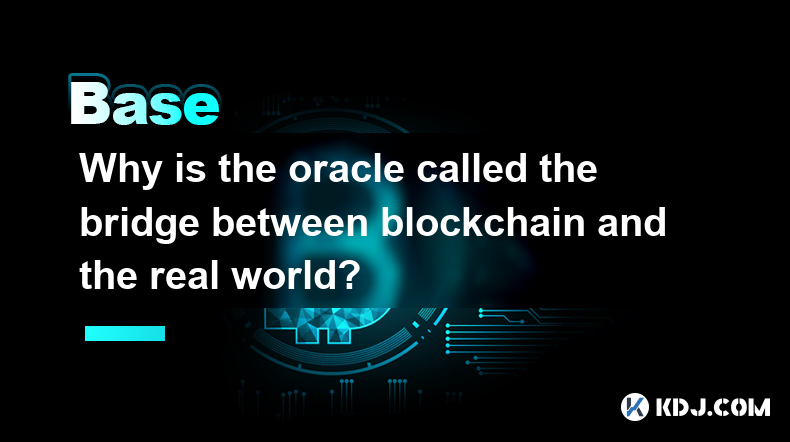
Why is the oracle called the bridge between blockchain and the real world?
Apr 04,2025 at 04:00am
The concept of an oracle in the cryptocurrency and blockchain world is crucial for understanding how these decentralized systems interact with external data. The oracle is often referred to as the bridge between blockchain and the real world because it serves as a vital intermediary that fetches, verifies, and transmits off-chain data to the on-chain en...
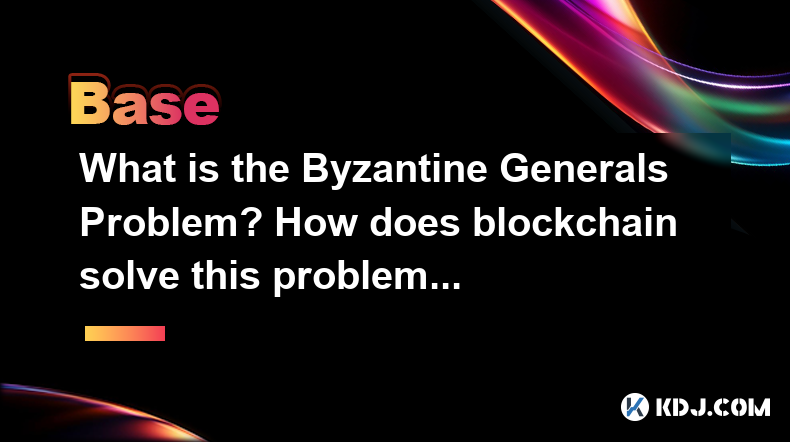
What is the Byzantine Generals Problem? How does blockchain solve this problem?
Apr 05,2025 at 06:29am
The Byzantine Generals Problem is a classic problem in the field of distributed computing and computer science, which has significant implications for the reliability and security of decentralized systems, including blockchain technology. This problem is named after a hypothetical scenario involving several generals of the Byzantine army who must coordi...
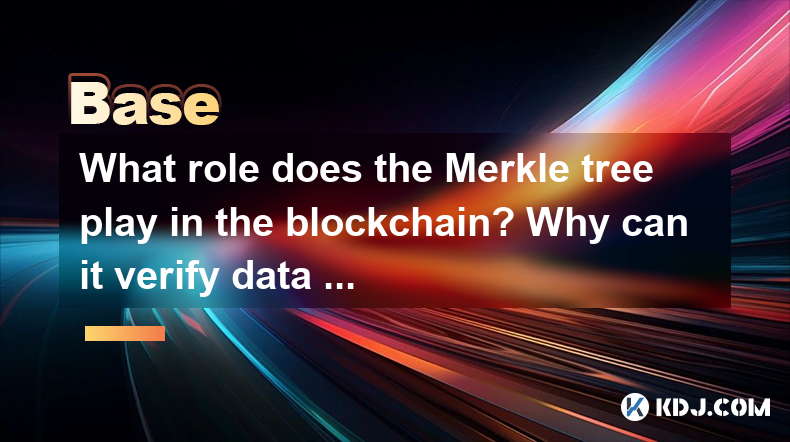
What role does the Merkle tree play in the blockchain? Why can it verify data integrity?
Apr 04,2025 at 01:29pm
The Merkle tree plays a crucial role in the blockchain, primarily due to its ability to efficiently and securely verify data integrity. This article will delve into the structure of a Merkle tree, its implementation in blockchain, and how it ensures the integrity of data. Understanding the Structure of a Merkle TreeA Merkle tree, also known as a hash tr...
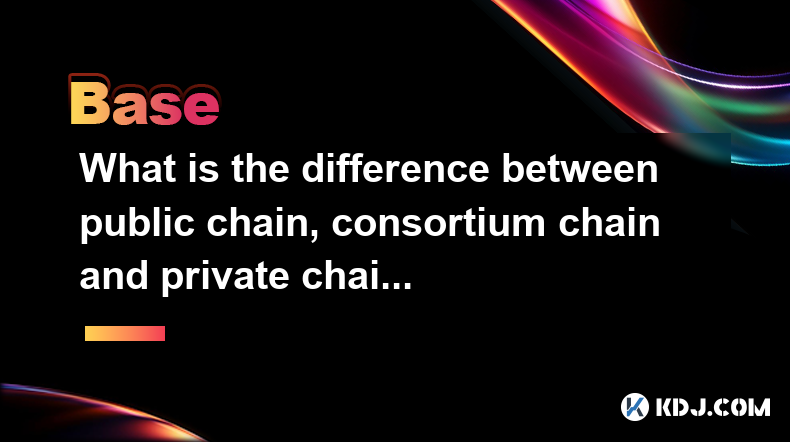
What is the difference between public chain, consortium chain and private chain? What scenarios are suitable for each?
Apr 04,2025 at 09:21pm
In the world of blockchain technology, understanding the differences between public chains, consortium chains, and private chains is crucial for selecting the right type of blockchain for specific applications. Each type of blockchain has its own unique characteristics and use cases, which we will explore in detail. Understanding Public ChainsPublic cha...
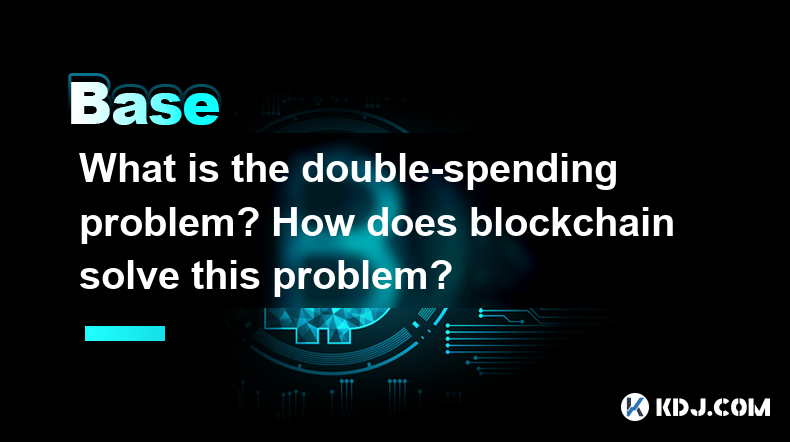
What is the double-spending problem? How does blockchain solve this problem?
Apr 04,2025 at 09:07am
The double-spending problem is a significant challenge in the realm of digital currencies. Double-spending refers to the potential for a digital currency to be spent more than once. This issue arises because digital files, unlike physical cash, can be easily duplicated. If not addressed, double-spending could undermine the integrity and trust in any dig...
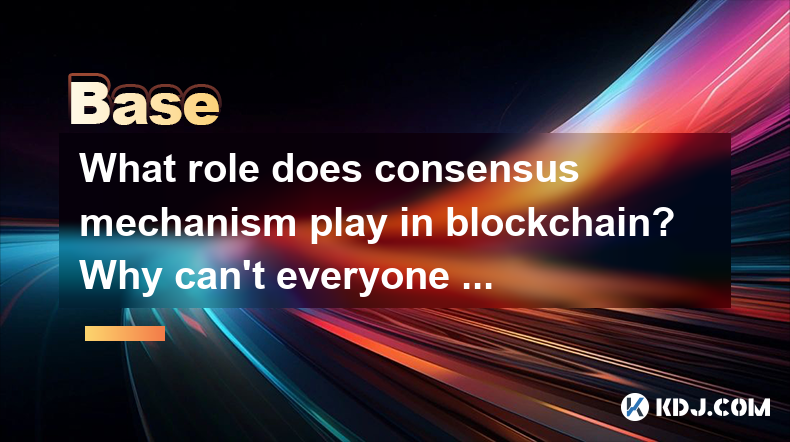
What role does consensus mechanism play in blockchain? Why can't everyone keep accounts?
Apr 05,2025 at 12:29am
The consensus mechanism is a fundamental component of blockchain technology, serving as the backbone for maintaining the integrity and security of the network. It ensures that all participants in the network agree on the state of the ledger, which is crucial for the decentralized nature of blockchain. Without a consensus mechanism, the decentralized sys...

Why is the oracle called the bridge between blockchain and the real world?
Apr 04,2025 at 04:00am
The concept of an oracle in the cryptocurrency and blockchain world is crucial for understanding how these decentralized systems interact with external data. The oracle is often referred to as the bridge between blockchain and the real world because it serves as a vital intermediary that fetches, verifies, and transmits off-chain data to the on-chain en...

What is the Byzantine Generals Problem? How does blockchain solve this problem?
Apr 05,2025 at 06:29am
The Byzantine Generals Problem is a classic problem in the field of distributed computing and computer science, which has significant implications for the reliability and security of decentralized systems, including blockchain technology. This problem is named after a hypothetical scenario involving several generals of the Byzantine army who must coordi...

What role does the Merkle tree play in the blockchain? Why can it verify data integrity?
Apr 04,2025 at 01:29pm
The Merkle tree plays a crucial role in the blockchain, primarily due to its ability to efficiently and securely verify data integrity. This article will delve into the structure of a Merkle tree, its implementation in blockchain, and how it ensures the integrity of data. Understanding the Structure of a Merkle TreeA Merkle tree, also known as a hash tr...

What is the difference between public chain, consortium chain and private chain? What scenarios are suitable for each?
Apr 04,2025 at 09:21pm
In the world of blockchain technology, understanding the differences between public chains, consortium chains, and private chains is crucial for selecting the right type of blockchain for specific applications. Each type of blockchain has its own unique characteristics and use cases, which we will explore in detail. Understanding Public ChainsPublic cha...

What is the double-spending problem? How does blockchain solve this problem?
Apr 04,2025 at 09:07am
The double-spending problem is a significant challenge in the realm of digital currencies. Double-spending refers to the potential for a digital currency to be spent more than once. This issue arises because digital files, unlike physical cash, can be easily duplicated. If not addressed, double-spending could undermine the integrity and trust in any dig...

What role does consensus mechanism play in blockchain? Why can't everyone keep accounts?
Apr 05,2025 at 12:29am
The consensus mechanism is a fundamental component of blockchain technology, serving as the backbone for maintaining the integrity and security of the network. It ensures that all participants in the network agree on the state of the ledger, which is crucial for the decentralized nature of blockchain. Without a consensus mechanism, the decentralized sys...
See all articles





















































































